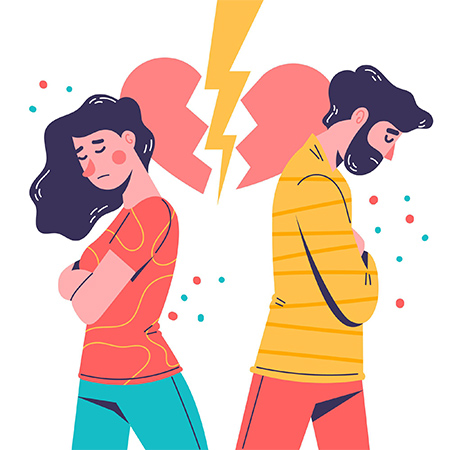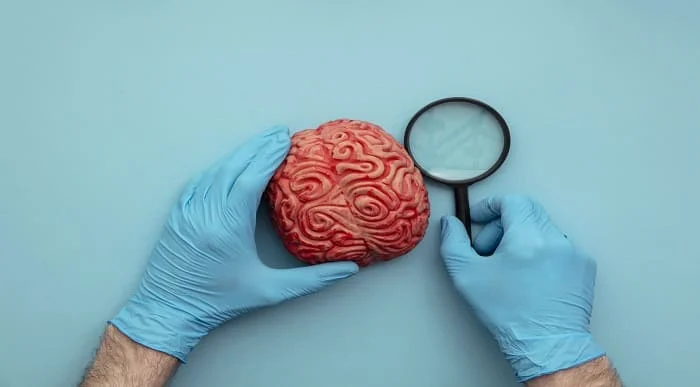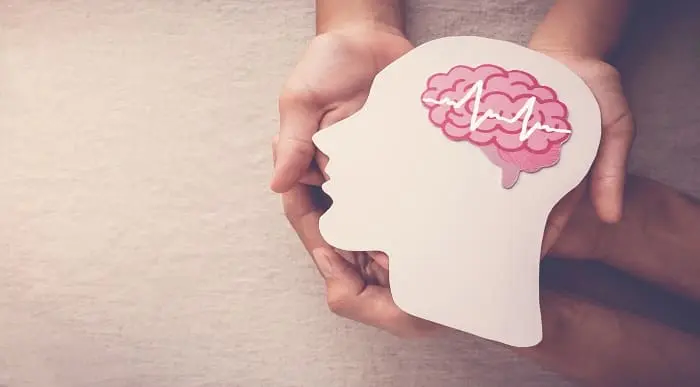Health and Social Care
Ending a Relationship Because of My Mental Health
It’s never easy to end a relationship, and it’s even more complicated if the underlying reason is your mental health. But do ask yourself first, are you really “ending a relationship because of my mental health”, or is your mental health deteriorating because of constant emotional abuse? That’s the topic we will deal with today.
If you’re on this page, then you’re already mentally distressed. This blog aims to point you out how to take it easy and lighten the burden of the mental pressure you’re going through.
You’ll be surprised to know that it’s not always your fault, even though it might seem like it. So, let’s get started.
Table of Content
- Why Mental Health is Important in a Relationship?
- Mental Illness and Relationship Breakdown
- How Would You Detect an Unhealthy Pattern in Your Relationship?
- Breaking Up
- FAQs
- Is it ok to break up with someone because of your mental health?
- Can depression make you want to leave a relationship?
- When is it time to leave a mentally ill partner?
- Is it wrong to break up with someone because of their mental illness?
- Is it worth dating someone with mental health issues?
- Can a person with mental illness get married?
- How can mental illness make breakups trickier?
- Conclusion
- What to Read Next:
Why Mental Health is Important in a Relationship?
Relationships aren’t always easy to maintain. After all, you’re dealing with a person who is probably investing time, effort and other resources to be with you. As a result, the stakes are always high.
What is even more daunting is the fact that we have little opportunity to learn how our romantic relationships should be. Like many other things that are claimed to be universal and natural, love is one of them. But, love is one of those things that comes in millions of flavours. You never know what to expect.
It’s like we are tossed into the water and expected to swim to the surface without learning how to swim first.
This is where our mental health comes in. Dealing with mental illness in a relationship can make things even more complicated. If we aren’t focused and interested, the message our heedlessness will send can be devastating to our partners. Our relationships will obviously somewhat dictate our mental health if we invest a lot of mental energy in them. If things aren’t going well in a close relationship, your mental health may suffer.
But it’s also crucial to remember that our mental health has an impact on how we connect with others and form relationships.
Mental Illness and Relationship Breakdown
“Ending a relationship because of my mental health”, if you’ve told your friend the same thing, you should read this before going for their suggestions.
Stress, depression and anxiety are three of the most common mental health issues that can affect one’s ability to engage and connect with people. You can be affected indirectly as well. If someone you care about has a mental health problem, it can be painful to see them struggle- and your own mental health could suffer as a result.
So, let’s discuss these issues.
Stress
Anyone who has ever been stressed knows how detrimental stress can be to a relationship. It can make you feel down. As a result, you will spend more time alone than usual. It can also cause you to dispute with your partner or lose your temper more regularly.
If you frequently react negatively because, under too much stress, your relationships will most likely suffer the same strain. For example, if you begin to withdraw from your relationship, they may believe you are pushing them away. However, if you’re irritable more than usual, your partner or other loved ones may react to mitigate the situation. Common responses under this type of situation involve being defensive and argumentative.
Depression
Depression and relationships are things that don’t go together.
However, having a strong, healthy relationship might help you recover faster when you feel down or depressed. But the opposite happens when you involve yourself in a dysfunctional relationship. It’ll have a profoundly negative impact on your mental health and make depression symptoms worse.
According to experts at the relationship counselling charity Relate, people who are unhappy in their relationships are three times more likely to be depressed than those who are happy. According to the organisation, more than 60% of persons with depression feel their mental disorder is caused by relationship troubles, according to some surveys.
Depression makes it harder to communicate effectively, which can be frustrating to your loved ones. You may also begin to feel guilty about making others’ lives difficult, which can lower your self-esteem.
On the other hand, if your loved one is sad, you may feel more pressure to make sure life runs smoothly by taking on more responsibility than you’re used to. This situation may leave you fatigued and worn out, and you may lose patience with them sooner or later.
Anxiety
If you’re constantly feeling anxious, that pressure of anxiousness will also shift to your relationships. Anxiety makes you tense, which makes it difficult for you to relax with your partner, friends, or family.
Thus you may not feel 100 per cent confident in your relationship with your other half. You’ll constantly be worried that it will end, or you might require continual reassurance that they won’t leave you. Neither of these will result in a happy marriage.
Meanwhile, it can also be distressing to watch someone you care about struggle with anxiety. For example, some people may get concerned that they are the source of anxiety in their partner or loved one. This will add to the already stressed circumstances in the relationship.
Is It You or Them?
Being in an unhealthy relationship can start innocently enough. It’s similar to a sweater with a pull. You detect a small flaw in the cloth, and before you know it, the entire thing is unravelling.
So, try to understand where the issues stem from. Saying something like “My girlfriend has mental health issues” is no valid reason for them to leave their partner.
Your mental health issue is also an invalid reason to leave your relationship either. In fact, if your partner is supportive, they’ll help to keep yourself balanced. However, as we discussed, if tensions arise between you and your partner, you’ll feel even more down. This is especially true if your partner is toxic.
Check the blog and learn how you can help others facing issues in their relationships.

Deep Tissue Massage Online Course
- Accredited Courses
- Tutor Support Included
- 3 Installment Plan at checkout
- 14 Days Money Back Guarantee
How Would You Detect an Unhealthy Pattern in Your Relationship?
Prepare a set of bullet points specific to your needs and circumstances. Then check each of them one by one against your current situation. Finally, it will help you quantify the issues in your relationship.
While every relationship is different, we can give you a set of bullet points to measure your relationship against. As these are made by observing typical human behaviours, they’ll probably fit your situation just fine.
Hopefully, after this, you won’t be ending a relationship because of mental health.
1. Effort
Is this relationship worth the effort it takes to keep it going? Who is putting more effort into this relationship?
2. Commitment
Are you committed to your partner? If you had met today, would you have chosen them as partners, or have you been hanging on to this connection out of habit?
3. Your Needs are also a Priority
Does your partner keep your interest in mind too? Do they make an active effort to ensure that this is addressed? Remember, your needs have to be within their capability. No soul can take a burden beyond its means
4. Crave Their Companion
Do you feel good about yourself or uneasy while you’re around this person?
5. Competition
Does your partner treat you as an equal instead of being competitive with you?
6. Inspiration
Positive people will bring out the best in you. The vice versa will happen when dealing with negative people. Which one is the case in your current situation?
7. Trust
Trust is one of the most important aspects of any relationship. Can you trust your partner with your secrets, personal messages or even material things like money? Do you think you rely on them in an emergency? Are you able to express your emotions openly, like you’re suffering from depression and expect some support in return?
8. Similarity
Do you share similar beliefs and interests? Do you gain anything from the differences if you don’t?
9. Sharing the Responsibility
Do you receive as much as you give?
10. Objectify
Would it improve your life if you put effort into this relationship?
Breaking Up
If you detect that your partner is being toxic to you and isn’t investing the time and effort it deserves, then evaluate if it’s worth going on like this. Most of the time, it’s best to get out of this type of toxic relationship before you end up hurting yourself mentally.
When you initiate a breakup, keep the following things in mind.
- Initiate the breakup as soon as possible.
- Take charge of the breakup. Don’t let go of the driver’s seat.
- If possible, be honest and transparent.
- Consider the fact that you may face some uncomfortable conversations and prepare yourself accordingly.
- Never react aggressively. Think analytically and show logic on why you are leaving.
- Hold off on “friendship”.
- Treat your partner nicely. However, if you have experienced physical or sexual abuse, don’t let your partner blackmail you in any way and seek help from family and friends. You may talk with mental health professionals, who always give you the best advice.
Learn how to develop your counselling skills and help others facing similar issues. Click here to know better.
FAQs
Is it ok to break up with someone because of your mental health?
It is never okay. Like we said, anyone may suffer from mental health. Discuss it with your partner. Most of the time, they will help you recover. However, if they feel uncomfortable around you, take note of the things that is causing their discomfort. Both of you have to show each other some compassion and consideration in this regard.
Can depression make you want to leave a relationship?
It certainly can. Depression is a serious mental health issue. If you have been suffering from depression for an extended period of time, consult a mental health professional.
When is it time to leave a mentally ill partner?
Try to be supportive. Help them consult mental health professionals if you’re unsure what to do. However, don’t stress yourself too much. If it becomes unbearable, leave amicably.
Is it wrong to break up with someone because of their mental illness?
There is no right or wrong answer here; it always depends on the situation.
Is it worth dating someone with mental health issues?
Mental health issues aren’t always permanent. Your partner may be going through some stressful times. If the person has a beautiful soul, why not give it a try? It’s always worth giving it a try if you like them that much. Of course, you can always leave them amicably if things don’t turn out well.
Can a person with mental illness get married?
Read the answer to the question above, “Is it worth dating someone with mental health issues?”. The same answer applies to both of these questions.
How can mental illness make breakups trickier?
You may feel guilty when leaving a person who is mentally ill. But don’t. It’s not your fault. If you tried your best to help your partner, that’s all that could have done. Asking you to sacrifice your interests in this regard will both endanger you and your partner in the long run.
Conclusion
Just because you’re thinking about terminating a relationship doesn’t mean you don’t care about or have feelings for your partner. Sometimes people aren’t compatible with each other and it’s perfectly normal. You can certainly end a relationship while keeping compassion and goodwill in place too.
However, if you’re like, “I’m ending a relationship because of my mental health”, this is certainly not the most efficient approach to life. You’ll go through many breakups before understanding that mental health issue has no direct correlation to a healthy relationship. Talk to your partner and openly discuss your issues. You may be surprised that they’ll be supportive and will take extra care of you during your difficult times.
What to Read Next:









